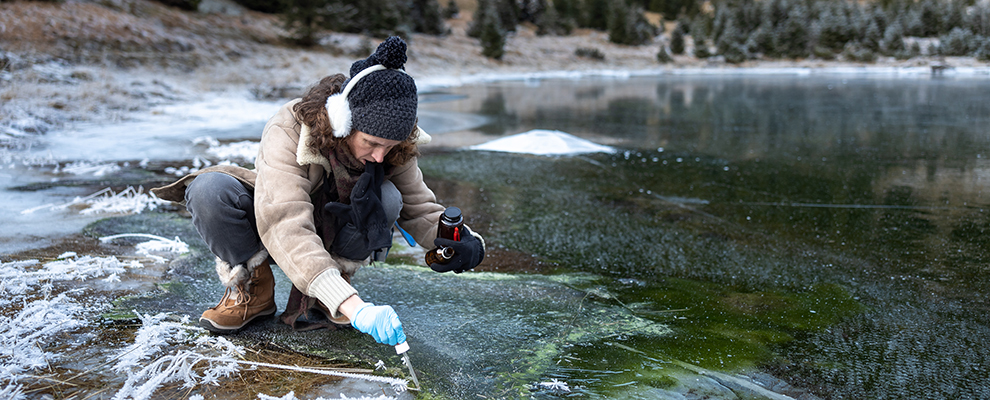Water and technology: A sustainable future

While Canada has a large share of the world’s freshwater, threats remain to our water supply. Overuse, pollution, poorly managed wastewater, and the growing impacts of climate change pose significant challenges. Water scarcity is also an issue in some areas, with much of Canada’s freshwater draining to the north, away from the 85 per cent of the population that lives within 300 kilometres of the southern border. This makes harnessing and managing our water resources difficult.
Clearly, water sustainability impacts all of us, but through innovation, we can adapt to and develop mitigation strategies to better steward our freshwater supply. For example, technological advances in artificial intelligence allow us to discover hidden insights within the multiplying sources of data derived from environmental sensing and mapping technologies. In the next decade, we will advance more powerful tools and discoveries by harnessing AI and quantum computing.
Here are some examples of what IBM is doing in Canada in support of water sustainability. And there are many more examples of companies across the country contributing to this important, time-sensitive cause. The common theme is that we aren’t going it alone — we continue to collaborate and work towards a shared goal that will benefit us all.
Water recycling and better data
The University of Alberta and National Research Council of Canada are applying IBM-patented nanotechnology to advance water filtration and recycling that has the potential to improve water re-use in industries such as oil and gas, manufacturing, and even small businesses like golf courses and car washes.
A research partnership between IBM Canada and the University of Calgary led to the development of a collaboration platform called SWIM (Sustainable Watershed Integrated Management) with the goal of improving watershed management. The tool, which was built using IBM technology, is being used in Calgary’s Bow River Basin to amalgamate disparate data sets and perform deep analyses to support river basin management. The next stages of this platform will infuse AI and machine learning to forecast future scenarios of change, and couple land use, such as agriculture, to water management. As the federal government works to establish the Canada Water Agency, tools such as SWIM could enhance our ability to protect, conserve, and understand our water resources.
Reducing water consumption
IBM’s only semiconductor assembly and testing facility in the world is in Bromont, Quebec. Manufacturing is a water-intensive industry, and our team has reduced water consumption by 20% since 2015 using innovative water recycling methods, which translates into 12.6 million US gallons of water conservation per year (or more than 47,500 cubic metres).
Indigenous knowledge and water technology
One of our P-TECH (Pathways in Technology, Early College High School) educational partners, Six Nations Polytechnic STEAM Academy will move forward with the launch the Ohnegi’yo Water Project with its P-TECH students. The team will be using Watson Studio to predict weather and environment conditions, and students will create a dashboard, artificial intelligence models and an open data source that encourages scientific, technological and professional literacy, all underpinned by Hodinohsó:ni values and knowledge.
Inspiring developers and young Canadians to create solutions
Today, IBM launched the 2021 Call for Code Global Challenge and one of the key themes of the challenge is clean water and sanitation. Some amazing innovations have come from these challenges. For example, Liquid Prep, the winner of the 2019 Call for Code IBM employee challenge, uses an IoT soil humidity sensor and weather data to deliver insights via a cloud-hosted mobile app. The solution is designed to help small farms know when to water crops in climate distressed areas. Developers, designers, and product managers in Canada are encouraged to get involved in Liquid Prep’s project via the Linux Foundation, and to put forward their own great ideas for Call for Code.
IBM Canada also partners with the Aquahacking Challenge, which engages young Canadians aged 18-35 to develop entrepreneurial skills and create solutions to freshwater issues. Since 2015, 28 startups have been established through Aquahacking challenges across Canada.
Protecting water is our collective responsibility
At IBM Canada, we believe technology is pivotal to solving challenges with clean water. We will continue be a catalyst alongside government, industry, and academic stakeholders, providing support through our technology and expertise.
To mark World Water Day, I want to encourage all of my Canadian business peers and partners to think about what more we can do. Whether it’s lending your expertise or financial support, identifying opportunities to reduce water usage, or enabling others with your products or services, there is something all of us can do.

Claude Guay, President and General Manager, IBM Canada
LinkedIn: https://www.linkedin.com/in/claudeguay/
Twitter: https://twitter.com/ClaudeGuay


